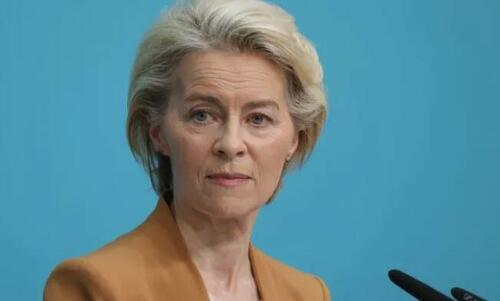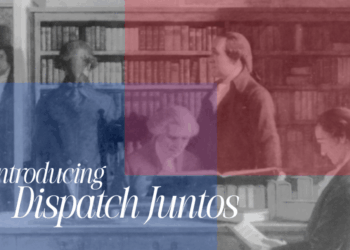Authored by Thomas Fazi via UnHerd.com,
The EU loves talking about freedom.
Just look at one of its recent press releases, launching something called the European Democracy Shield, which promises to protect everything from “free people” to “free elections” to — this being Brussels — “a vibrant civil society”.
All admirable stuff, perhaps, at least on paper.
In reality, though, the Democracy Shield is just the latest vision in unfreedom: suppressing dissent and policing speech under the pretext of defending democracy from foreign interference and fake news.
As part of the Democracy Shield, the Commission proposes the creation of a Monitoring Centre that would identify and remove “false content” and “disinformation” from the internet. As Henna Virkkunen, Executive Vice President for Security and Democracy, stated, the Shield will enable Europe to “respond faster and more effectively to information manipulation and hybrid threats”. The EU’s High Representative for Foreign and Security Policy, Kaja Kallas, made no secret of the anti-Russian nature of the initiative: “we are seeing campaigns, including from Russia, specifically designed to polarise our citizens, undermine trust in our institutions and pollute politics in our countries.”
The term “independent” appears repeatedly in the press release. A new “independent European network of fact-checkers” will be set up in all official EU languages, while the European Digital Media Observatory (EDMO), the EU’s flagship “fact-checking” network, financed to the tune of almost €30 million, will gain new “independent” analytical powers to monitor elections and crisis situations. But, remember, independence in Brussels translates to financial dependence on the Commission. Indeed, to guarantee this “independence”, the Commission promises generous funding to “independent” NGOs and media outlets.
The Democracy Shield builds upon the recent Digital Services Act (DSA), the most sweeping internet regulation ever implemented in Europe. In theory, these initiatives are meant to protect democracy; in practice, they do the opposite. Their aim isn’t to “fight disinformation”, as claimed, but rather to control the narrative at a time when Europe’s political elites are facing unprecedented levels of public distrust, by centralising control over the flow of information and imposing a single “truth” defined by Brussels. In short, the European Commission is building a continent-wide censorship machine
As one EU diplomat recently put it, in truly Orwellian fashion: “Freedom of speech remains for everyone. At the same time, however, citizens must be free from interference.” But who decides what constitutes “interference”? Who determines what is “true” and what is “fake”? The same institutions and corporate media outlets that have repeatedly engaged in fearmongering and disinformation themselves. Just a few weeks ago, Ursula von der Leyen claimed that the GPS system on her plane had been jammed by Russia — an allegation quickly debunked by analysts. Meanwhile, the BBC, often held up as a paragon of journalistic integrity, was recently caught editing footage of a Donald Trump speech to make it appear more extreme.
The EU claims to be protecting citizens from “falsehoods” but on what democratic or moral basis does the Commission assume the authority to decide what is true, especially when it is clear that the EU’s political-media establishment itself engages in disinformation and propaganda on a regular basis? Moreover, when so-called independent fact-checkers are hand-picked and financed by the Commission itself, the result is a closed feedback loop: the EU funds institutions that then “verify” and amplify the EU’s own narratives. The Democracy Shield, like its predecessors, thus institutionalises the power to define reality itself.
In a series of reports, I have shown that the European Union already operates a vast propaganda and censorship apparatus that spans every level of civil society — NGOs, think tanks, the media and even academia. The cornerstone of this system is a network of EU-funded programmes — notably CERV (Citizens, Equality, Rights and Values), Creative Europe and the Jean Monnet initiative — that collectively funnel billions of euros into organisations that are, in theory, “independent” but are in fact deeply enmeshed in the Brussels machine.
Through the CERV programme alone — which boasts a budget of almost €2 billion for 2021-2027 — more than 3,000 NGOs have received funding to carry out over 1,000 projects. Officially, these funds promote “European values”. In practice, they finance progressive and pro-EU activism: gender ideology, multiculturalism, anti-nationalism and “countering Euroscepticism”. Many projects are explicitly designed to “increase trust in the EU” or “counter anti-EU narratives”. Meanwhile, NGOs in Central and Eastern Europe are generously funded to “combat autocratic narratives” and “challenge Euroscepticism”, often directly targeting governments in Poland (under the previous executive) or Hungary — external influence strategies not unlike those historically associated with agencies like USAID.
The result is a pseudo-civil society — a network of nominally “grassroots” actors functioning as proxies for the Commission, amplifying its agenda and manufacturing the illusion of popular support for its policies.
The same pattern applies to the media. My research has shown that the EU channels at least €80 million annually directly to newspapers, broadcasters, news agencies and “journalistic partnerships”— amounting to nearly €1 billion over the past decade. Programmes such as IMREG (Information Measures for Cohesion Policy) have paid media outlets to publish articles praising EU cohesion funds, in some cases without even disclosing that the content was EU-financed. The Commission calls it “raising awareness”. In any other context, it would be called covert advertising or propaganda.
The EU’s propaganda machine extends into academia as well. Through the Jean Monnet programme, the Commission allocates about €25 million a year to universities and research institutes worldwide, financing over 1,500 Jean Monnet Chairs in 700 institutions. The goal is not to support independent scholarship but to embed pro-EU ideology into higher education. Official documents state explicitly that recipients are expected to act as “ambassadors of the European Union” and “outreach agents” engaging with media and NGOs. The academy has effectively been transformed into an ideological instrument.
With the Democracy Shield, the Commission now intends to vastly expand this machinery. It proposes to not only establish what amounts to a de facto Ministry of Truth, but also to inject even more money into NGOs, “independent” media and fact-checking networks tasked with promoting “European values”. Von der Leyen is, in effect, buying consensus — and using citizens’ own money to do it — collapsing the boundaries between the European super-state, media, civil society and academia.
And if the EU’s goal, here, were merely to manipulate narratives, that would be alarming enough. But the pattern now points towards direct interference in electoral processes. We have already seen this play out in countries like Romania and Moldova, where local elites — with open or tacit support from Brussels — invoked the spectre of “Russian interference” (without providing much evidence) to justify blatant manipulation of domestic elections. In Romania, authorities cancelled an election and barred the leading populist candidate from running. In Moldova, pro-EU authorities used “security concerns” to prevent Russia-leaning expatriates from voting. Protecting democracy thus becomes the pretext for suspending it, even as the Democracy Shield explicitly foresees strengthening the European Cooperation Network for Elections and, ominously, promoting “systematic exchanges on the integrity of electoral processes”.
The Commission’s appetite for control is not limited to information and elections. Ursula von der Leyen recently also initiated the creation of a new intelligence unit under the direct authority of the European Commission. The goal, according to the Financial Times, is to unify intelligence data from member states and “enhance the EU’s ability to detect and respond to threats”. The plan foresees the eventual creation of a European intelligence cooperation service, effectively a supranational agency that would operate alongside national intelligence services. Officially, it would enhance “strategic autonomy”. In practice, it would likely function as a subsidiary of Nato and, by extension, of the CIA, especially since the same proposal explicitly calls for “strengthening EU-NATO cooperation”.
It points to a broader worrying trend of power centralisation in the hands of the Commission — and of von der Leyen personally. Understandably, many observers find the prospect of giving “Empress Ursula” an army of supranational spies — operating beyond the oversight of national parliaments — profoundly disturbing. Giving an unelected, opaque institution like the Commission its own intelligence apparatus would mark yet another milestone in Europe’s transformation into a techno-authoritarian juggernaut — one that surveils not foreign enemies, but its own citizens.
Seen in this context, the Democracy Shield appears like nothing more than a tool to further institutionalise a regime of managed speech and narrative control. Its goal is to police online speech according to vague, politically charged definitions of “disinformation”; to compel platforms, journalists, academics and citizens alike to conform to a narrow, Commission-approved worldview; and to silence dissent in the name of “fighting foreign interference”. Yet it is becoming increasingly clear that the real war on democracy isn’t being waged by Moscow or Beijing; it is being waged from within, by the very institutions claiming to defend it.
Loading recommendations…


















